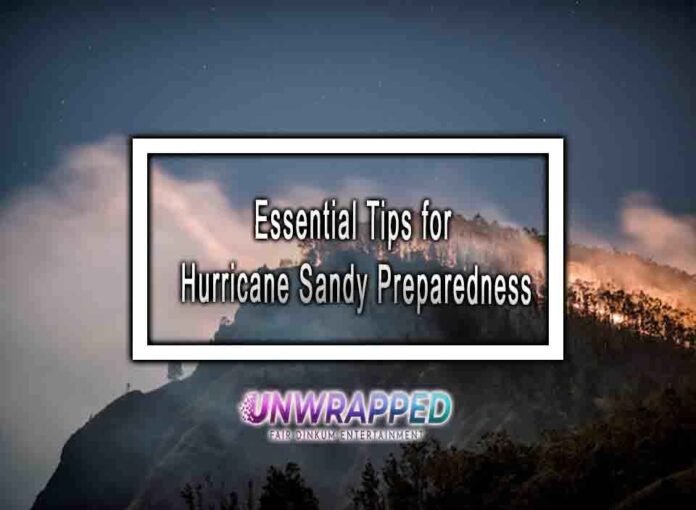Hurricane Sandy, which struck the East Coast of the United States in 2012, was a powerful and destructive storm. Being prepared for hurricanes and other severe weather events is crucial for minimizing risks and ensuring the safety of individuals and communities. Here are essential tips for hurricane preparedness, drawing insights from the experience of Hurricane Sandy:
Before the Hurricane:
- Stay Informed:
- Monitor weather forecasts from reliable sources. Pay attention to official updates and warnings issued by meteorological agencies.

- Monitor weather forecasts from reliable sources. Pay attention to official updates and warnings issued by meteorological agencies.
- Emergency Kit:
- Prepare an emergency kit that includes essentials such as non-perishable food, water, medications, first aid supplies, flashlight, batteries, important documents, and cash. Ensure you have enough supplies to last for several days.
- Evacuation Plan:
- Familiarize yourself with local evacuation routes and shelters. Have a plan in place for where you will go if evacuation is necessary. Consider the needs of pets in your evacuation plan.
- Secure Your Home:
- Protect windows with storm shutters or plywood. Secure outdoor furniture and objects that could become projectiles in high winds. Trim trees and remove dead branches to reduce the risk of falling debris.
- Backup Power:
- Consider having a backup power source, such as a generator, and make sure it is in good working condition. Keep extra fuel on hand.
During the Hurricane:
- Stay Indoors:
- Once the hurricane approaches, stay indoors and away from windows. Do not go outside during the storm, as high winds and flying debris pose significant dangers.
- Evacuate if Advised:
- If authorities recommend evacuation, follow their instructions promptly. Do not delay, as evacuation routes may become congested, and conditions can worsen rapidly.
- Keep Emergency Contacts:
- Have a list of emergency contacts, including local authorities, shelters, and family members. Ensure everyone in your household knows how to reach these contacts.
- Listen to Weather Updates:
- Keep a battery-powered weather radio or a smartphone with a weather app to receive real-time updates. Stay informed about the hurricane’s progress and any changes in its trajectory.
- Avoid Flooded Areas:
- Avoid walking or driving through flooded areas. Floodwaters can be deeper than they appear and may conceal dangerous debris or currents.
After the Hurricane:
- Wait for the All-Clear:
- Wait for official confirmation from authorities before venturing outside. Listen for updates and follow instructions from local emergency management.
- Beware of Hazards:
- Be cautious of downed power lines, flooded roads, and damaged structures. Report any unsafe conditions to local authorities.
- Check on Neighbors:
- Check on neighbors, especially those who may need assistance, such as the elderly or individuals with disabilities.
- Document Damage:
- Take photographs or videos of any damage to your property. This documentation can be useful for insurance claims and assistance applications.
- Avoid Using Open Flames:
- If there’s a risk of gas leaks, avoid using open flames or candles until it’s confirmed safe to do so. Use flashlights instead.
- Seek Medical Attention:
- Seek medical attention for injuries or health concerns. Be cautious of contaminated water and potential health hazards.
- Contact Loved Ones:
- Let family and friends know that you are safe. Use text messages or social media if phone lines are overloaded.
Remember that preparedness is key to mitigating the impact of hurricanes. Stay informed, have a plan in place, and be ready to take action when needed.











